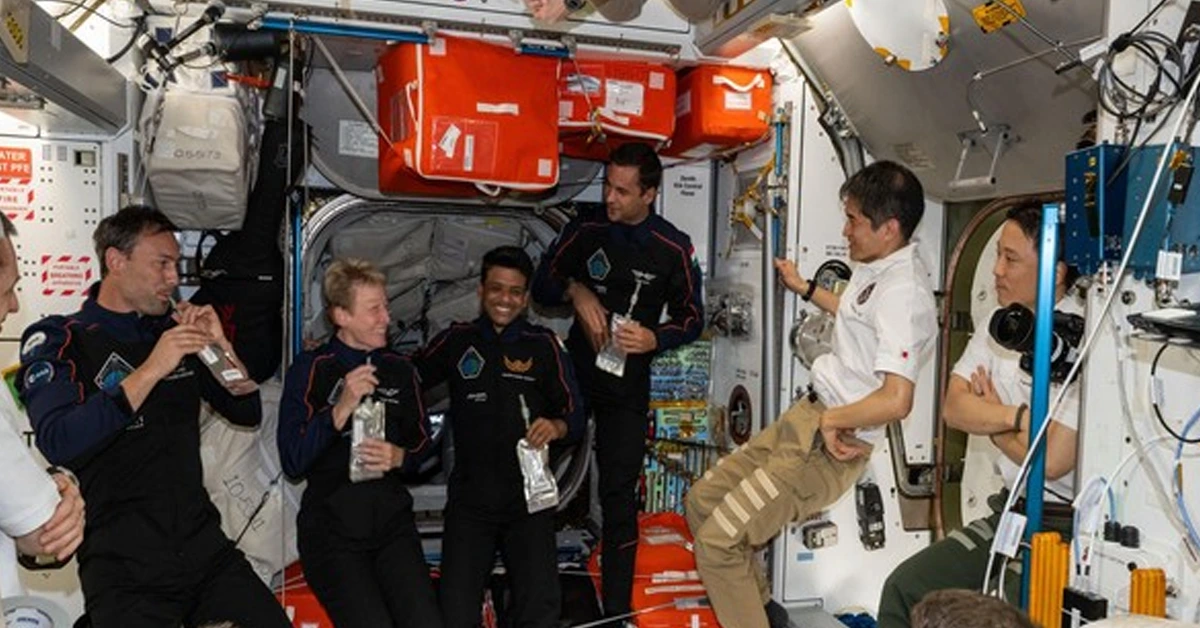
Group Captain Shubhanshu Shukla, representing the Indian Space Research Organisation (ISRO), has initiated a series of scientific experiments aboard the International Space Station (ISS) as part of the ongoing Axiom Mission 4 (Ax-4).
The mission, which began on June 25, has marked a historic milestone with Shukla becoming the first Indian astronaut to reach the ISS.
On June 30, 2025, Monday, Shukla conducted critical experiments focusing on muscle health, digestion, and mental well-being in space.
According to the National Aeronautics and Space Administration (NASA), he worked inside the Kibo laboratory’s Life Sciences Glovebox to study how muscle stem cells respond to microgravity.
The sealed and sterile glovebox allows astronauts to safely manage biological samples in space.
The key experiment, titled Myogenesis, investigates muscle regeneration under spaceflight conditions. Muscle loss is a common issue during extended space missions, caused in part by microgravity interfering with mitochondrial function—the process by which cells produce energy.
The study tests the effectiveness of certain metabolic supplements in supporting muscle repair.
Findings from this research could aid in developing treatments for age-related muscle decline and muscular disorders on Earth, while also improving astronaut health during long-duration missions.
In addition to lab work, Shukla recorded an educational video for Indian school students, explaining how the human digestive system adapts to space. NASA noted that this outreach effort aims to inspire young minds to explore science and space research.
The Ax-4 mission also involves scientific contributions from other international astronauts. Mission Commander Peggy Whitson, a veteran of multiple NASA missions, conducted vein scans on Hungarian astronaut Tibor Kapu using the ISS’s Ultrasound 2 device.
The scans are part of an ongoing investigation into how spaceflight affects blood pressure, balance, and vision.
Meanwhile, Polish astronaut Slawosz Uznanski-Wisniewski tested a brain-computer interface using near-infrared technology (fNIRS).
The experiment, known as PhotonGrav, assesses whether such interfaces can function effectively in microgravity.
He later joined Shukla and Whitson in filming material for a mental health study aimed at better understanding the psychological effects of space travel.
“The Ax-4 private astronauts had a science-packed Monday fulfilling research objectives for their home countries,” NASA stated in its daily update.
While the Ax-4 team focuses on privately funded experiments, the ISS Expedition 73 crew continues with NASA- and ESA-backed studies. Astronauts Anne McClain and Nichole Ayers conducted muscle stimulation and cognitive performance tests, while Jonny Kim assisted in processing blood samples for ESA’s Bone on ISS study.
Japanese astronaut Takuya Onishi collected biological samples for long-term health monitoring and carried out air quality checks in the Kibo module.
On the Russian side of the station, cosmonauts Sergey Ryzhikov and Alexey Zubritskiy prepared for the arrival of the “Progress 92” cargo spacecraft and loaded its predecessor, “Progress 90,” with waste for disposal. Cosmonaut Kirill Peskov completed a 24-hour cardiovascular monitoring session and prepared the European robotic arm for upcoming operations.
The Ax-4 mission launched on June 25 aboard a SpaceX Falcon 9 rocket from Kennedy Space Center’s Launch Complex 39A.
The crew’s Dragon spacecraft docked with the ISS on June 26 at 4:05 pm IST, ahead of schedule. The mission is expected to last up to 14 days.
With his groundbreaking presence aboard the ISS, Shubanshu Shukla is not only expanding India’s space exploration footprint but also contributing to global scientific efforts that aim to benefit life both in space and on Earth.
ALSO READ | NASA Missions Spy First Possible ‘Survivor’ Planet
The Story Mug is a Guwahati-based Blogzine. Here, we believe in doing stories beyond the normal.